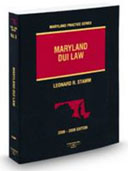What I have tried to do in the following blog is touch on the basics of preparing to represent a person charged with a DUI. It is not possible in this space to give more than a basic outline of what is required. What follows therefore, should be understood to just represent the tip of the iceberg. More detailed information can be found online, in relevant treatises, and at CLE (continuing legal education) seminars.
The lawyer’s preparation for a DUI begins with the first phone call or email by the prospective client. Counsel must find out the arrest date in order to advise the client to request a hearing with the Office of Administrative Hearings before the 30 day deadline expires if the client failed or refused a breath or blood test for alcohol or drugs. The client must be reminded to send in the hearing fee of $125 payable to the Maryland State Treasurer. I recommend the hearing request be mailed certified return receipt requested in order to protect against the hearing request being lost.
The initial consultation involves obtaining as much information as possible about the client and the case with the goal of obtaining the best possible result for the client in court and at the Maryland Motor Vehicle Administration (MVA). The lawyer must get from the client a brief life history and background, including education, military service, immigration status, marital and parental status, employment, need for a driver’s license, affect of license suspension or jail or probation on the client, prior record, prior efforts at alcohol education or treatment, a complete medical history, and a detailed recollection of the events leading up to and including the arrest and submission to any test, including drinking history. The lawyer must obtain and review all documents received by the client. I like to put the officer’s dates and times into a timeline in order to better understand the officer’s claimed sequence of events.
The lawyer should then explain to the client a range the possible administrative and judicial consequences faced, possible defenses, and likely outcomes. I always recommend an alcohol assessment, followed by alcohol education or treatment. Many judges expect defendants to have enrolled in an appropriate level of education and/or treatment soon after an arrest, or consider it mitigating. The lawyer should quote the defendant a fee and explain and present a written fee agreement. I also like to give the client a written list of things to do, which often include requesting the MVA hearing, taking pictures of the scene of the stop, obtaining a complete and PBJ driving record from the MVA or any other state where the client has recently held a driver’s license, and obtaining relevant medical records accompanied by a custodian’s certificate.
Once retained, the lawyer should file an appearance with the District Court or circuit court within 5 days of being retained. Along with the appearance line, counsel should consider filing discovery motions and a demand for the breath test operator, or with a blood test the phlebotomist and chemist to come to court and testify. In circuit court, counsel should also timely file mandatory motions. When discovery is received this should be cc’d to the client and reviewed carefully. If the State has requested discovery the State must be provided any documents intended to be used at trial prior to the court date. Additionally, the State should be provided an opportunity to inspect and copy any documents sought to be introduced under the business records exception 10 days before trial.
The lawyer should fully examine the officer’s report and/or video looking for possible defenses, research any legal issues to be presented and prepare memoranda of law or at least provide copies of the relevant cases. In the event the defense fails, before going to the court or MVA the lawyer must collect all relevant documents from the client including alcohol education or treatment letters, as well as letters from the employer if relevant. When appearing in court and the MVA counsel must be fully prepared to both defend on any legal issues and to offer mitigation if necessary. Finally, in the event of a result the client feels should be challenged, the lawyer must be ready to advise the client of appeal options, and if the client is jailed to request and post an appeal bond.
If you are facing serious traffic charges in Maryland call Leonard R. Stamm or Johanna Leshner of Goldstein & Stamm, P.A. at 301-345-0122 for a free consultation.
Leonard R. Stamm Goldstein & Stamm, P.A.
6301 Ivy Lane, Suite 504 Greenbelt, Maryland 20770 www.lstamm.com
301-345-0122 (fax) 301-441-4652
Author: West’s Maryland DUI Law

 Maryland DUI Lawyer Blog
Maryland DUI Lawyer Blog

